Library
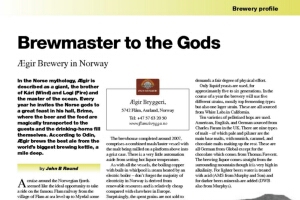 IBD Membership Required
IBD Membership Required
Brewmaster to the Gods - Ægir Brewery in Norway
By: John Round
01/10/2010
In the Norse mythology,Ægir is described as a giant, the brother of Kári (Wind) and Logi (Fire) and the master of the ocean. Every year he invites the Norse gods to a great feast in his hall, Brime, where the beer and the food are magically transported to the guests and the drinking-horns fill themselves. According to Odin, Ægir brews the best ale from the world’s biggest brewing kettle, a mile deep.
 IBD Membership Required
IBD Membership Required
Making the environment pay!
By: Eric Candy
01/10/2010
Brewer & Distiller International • October 2010 • www.ibd.org.uk 55 Do we have good cause to be proud of our industry’s achievements at reducing environmental impact? The answer is a resounding yes, not only by looking back at the achievements so far but also looking forward at the commitments to future improvement. Like a school report there is always the potential to do better.
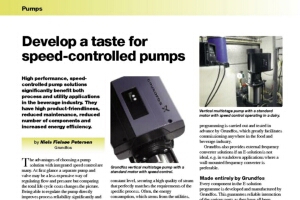 IBD Membership Required
IBD Membership Required
Develop a taste for speed-controlled pumps
By: Niels Petersen
01/10/2010
High performance, speedcontrolled pump solutions significantly benefit both process and utility applications in the beverage industry. They have high product-friendliness, reduced maintenance, reduced number of components and increased energy efficiency.
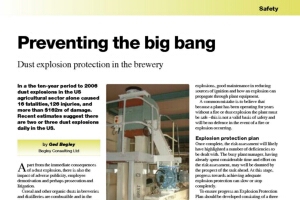 IBD Membership Required
IBD Membership Required
Dust explosion protection in the brewery
By: Ged Begley
01/10/2010
Brewer & Distiller International • October 2010 • www.ibd.org.uk 61 In a the ten-year period to 2006 dust explosions in the US agricultural sector alone caused 16 fatalities,126 injuries, and more than $162m of damage. Recent estimates suggest there are two or three dust explosions daily in the US.
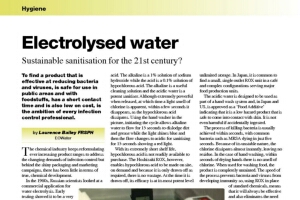 IBD Membership Required
IBD Membership Required
Electrolysed water - Sustainable sanitisation for the 21st century?
By: Laurence Bailey
01/10/2010
To find a product that is effective at reducing bacteria and viruses, is safe for use in public areas and with foodstuffs, has a short contact time and is also low on cost, is the ambition of every infection control professional.
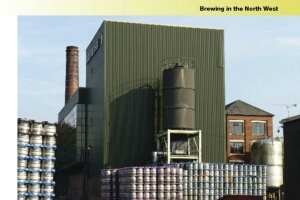 IBD Membership Required
IBD Membership Required
A small family firm - Thomas Hardy at Burtonwood and Kendal
By: Roger Putman
01/10/2010
There are no brands, no pubs, no distribution, no sales nor marketing at Thomas Hardy Brewing & Packaging which is owned and run by recent IBD President Peter Ward. It turns around £24million based on fees charged for brewing or packaging at its facilities in Burtonwood near Warrington and Kendal in the Lake District.
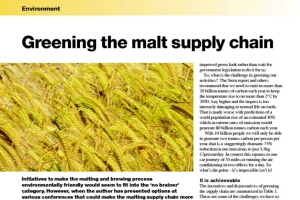 IBD Membership Required
IBD Membership Required
Greening the malt supply chain
By: Nigel Davies
01/10/2010
Initiatives to make the malting and brewing process environmentally friendly would seem to fit into the ‘no brainer’ category. However, when the author has presented options at various conferences that could make the malting supply chain more environmentally efficient he has been faced with a threatened boycott, told by other maltsters that there are more important things to worry about and by three international brewers that they like all this green stuff but they won’t be first to implement recycled products into their beer, just the packaging!
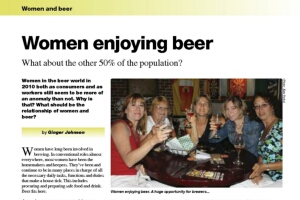 IBD Membership Required
IBD Membership Required
Women enjoying beer - What about the other 50% of the population?
By: Ginger Johnson
01/10/2010
Women in the beer world in 2010 both as consumers and as workers still seem to be more of an anomaly than not. Why is that? What should be the relationship of women and beer?
 IBD Membership Required
IBD Membership Required
The Expert Witness - The work of an authorised brewing and beverage technician
By: Jens Voigt
01/10/2010
Have you ever not been paid the full amount for your product or service? Have you ever had a piece of equipment, which did not perform as expected? In such cases disputes often arise and arguments exchanged between the involved parties. There are numerous examples in the brewing business, where the independent opinion helps to solve the case.
 IBD Membership Required
IBD Membership Required
The ultimate microbrewery
By: Roger Putman
01/10/2010
There are some 700 microbrewers active in the UK and most supply a few barrels a week to the local trade. Accordingly to Pete Brown’s Cask Report, the sector is in good heart and performing well against an overall adverse trend in beer sales. But are they all the same? Do they use old cellar tanks or buy a pre-owned five barrel kit and run it manually. Then after a long day, do they have to go out and do deliveries and knock on doors on the way back to get more customers?
Some of the content requires an active membership to view.
You can find out more here
Some of the content requires an active membership to view.
You can find out more here
